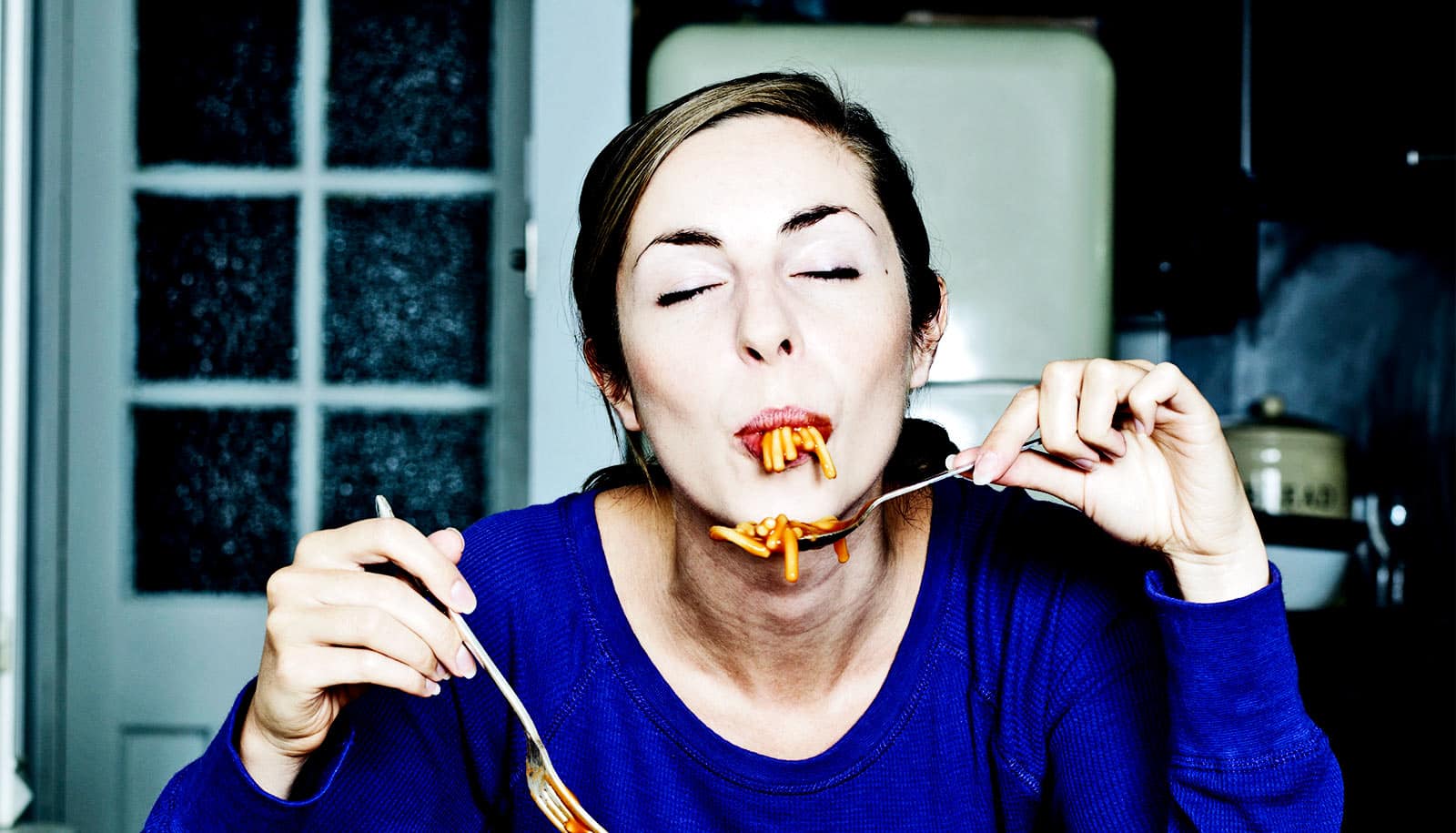In times of stress—like a full year of coping with COVID-19—many people turn to food for a source of comfort or control.
While modifications to typical diets are to be expected, living in a state of tension can cause a resurgence of disordered eating patterns.
National Eating Disorders Awareness Week, February 22-28, brings attention to a specific type of mental illness that affects people from all walks of life and can be fatal if left untreated.
Megan Mikhail, a doctoral student of clinical psychology in Michigan State University’s College of Social Science, specializing in eating disorders, shares some insights on how to avoid letting stress take hold of eating habits:
What is it about stress that pushes people to eat differently—and possibly unhealthily?
Stress can be a powerful trigger for disordered eating because of how it impacts people both psychologically and physiologically.
Psychologically, stressful situations often produce negative emotions, such as sadness, anxiety, or anger. Some people lose their appetite when experiencing these kinds of emotions, while others may eat more to feel better. This may be particularly true in situations like the current COVID-19 pandemic, when people may feel more socially isolated or find it more challenging to find other ways to relieve stress.
Physiologically, stress leads to activation of biological systems designed to help the body prepare to face threats, such as the hypothalamic–pituitary–adrenal, or HPA, axis, shown to affect eating behavior.
Are people who are anxious to begin with more likely to turn to unhealthy eating habits when overwhelmed or tense?
Anxiety and disordered eating are closely linked. Research has consistently shown that people with eating disorders are more likely to have anxiety and anxiety disorders, such as social anxiety disorder or obsessive-compulsive disorder. Recent work from our lab shows that the reverse is also true—people with clinically significant anxiety are significantly more likely to experience disordered eating in their lifetimes. One reason is that anxiety and disordered eating have shared genetic underpinnings. In other words, genes that are associated with increased risk for anxiety are also associated with disordered eating, though there are also some genes that are uniquely related to anxiety and eating disorders, respectively.
Beyond shared genetic risk factors, anxiety and disordered eating also have shared psychological risk factors that may be particularly salient in times of stress. For example, both people with anxiety disorders and people with eating disorders are more likely to report having limited strategies for regulating—like decreasing or managing—negative emotions, or express fear that their emotions will become uncontrollable or overwhelming. Disordered eating behaviors, such as binge eating or excessive exercise, may help people manage difficult feelings in the short term, but typically lead to more negative emotions in the long term.
How can you tell if you’re one of the people who is trending toward a disordered eating pattern versus someone who might just be a little hungrier than usual?
People’s dietary needs change across time, and it is totally okay to eat more if you feel hungry. One clue that your eating might be off track is if you find yourself eating when you are not hungry, or not eating when you are. A second key factor is how you feel about your eating and your body. People who are stuck in a pattern of disordered eating often find themselves feeling embarrassed, ashamed, or guilty after eating and may try to restrict their food intake after feeling like they have eaten too much. Unfortunately, fasting or dieting can actually be a powerful trigger for binge eating and dysregulated eating in vulnerable individuals, which can set up a vicious cycle.
Some people may also begin to eat or exercise in secret because of negative feelings about their eating or their body, or find that fears about their eating, weight, or body image are interfering with important things in their life. Examples of this are being afraid to share a meal with others, or afraid to wear certain clothes or engage in certain activities because of concerns about eating or body image. These are all signs that a person may be falling into a pattern of disordered eating and in need of help and support.
If you catch yourself as someone who turns to the pantry in times of stress, what are some ways to try and self-correct?
Perhaps counterintuitively, one of the best things to do is to make sure that you are eating regular meals with a range of foods that you enjoy and that nourish your body. For most people, this will include fruits and vegetables, as well as fats and carbohydrates that give your body fuel to do its thing.
People are more likely to binge eat on “forbidden foods,” or foods that they do not typically allow themselves to eat. Keeping your body nourished and giving yourself permission to eat the foods you enjoy can decrease the likelihood that you will fall into a pattern of disordered eating.
If you find yourself eating to soothe difficult emotions, it might be helpful to check in with yourself about what you are feeling and what you might need in that moment. For example, if you are feeling sad or lonely, it might help to talk with a friend on the phone, or to use a self-soothing strategy like taking a warm bath. Most importantly, be gentle with yourself—we are living in challenging times, and it is okay if your eating and exercise look a little different.
Is there a certain point where one might consider getting some help? If so, where should they turn?
Absolutely. Eating disorders are serious mental illnesses that can be very difficult to manage alone. If you find that thoughts about eating or body image are dominating your life or interfering with doing things you enjoy or that are important to you, that is a great reason to seek help. Similarly, if you or people close to you are concerned about how your eating and activity, such as excessive exercise, may be affecting your health, that may be a sign that you could benefit from professional support. Several kinds of psychological, or talk, therapy for disordered eating have been shown to be effective in research, including cognitive-behavioral therapy, which explores how thoughts, emotions and behaviors related to eating and body image may perpetuate disordered eating patterns. The National Eating Disorders Association has great resources for finding treatment providers, along with information about eating disorder research, treatment and advocacy.
An important note is that eating disorders can affect people of all genders, racial/ethnic backgrounds, sexual orientations, and body sizes. You can’t tell if someone has an eating disorder just by looking at them, and the severity of an eating disorder is not determined by the number on the scale. If you are concerned about your eating or body image, you are worthy of help and support.
Source: Michigan State University



